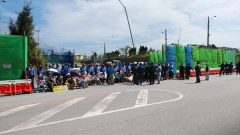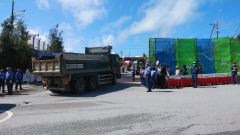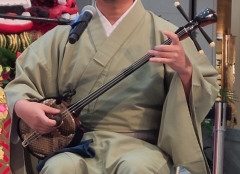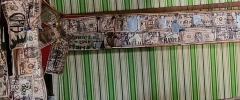20 August 2022
Novel: "Henoko Bar, Stars and Stripes" Chapter 7 "Sit Down Here"
In Henoko, Nago City, Okinawa Prefecture, shaken by the issue of the construction of a new U.S. military base, a female singer time slips to the time in the midst of the Vietnam War. What is the Henoko New Base Problem? What is the Vietnam War? What is America? What is Okinawa?
A short story in 9 chapters. Each chapter features famous songs from Japan, the United States and Okinawa.
Please read from Chapter 1.
The next morning, Naomi participated in a sit-in in front of the gate. Last night, as soon as she got back to the inn, she crawled into bed and fell asleep in tears.
It was hard to think about Tony and Jimmy. From that night to morning, she didn't see Genjiro again. The rooms they stayed in were separate, and before breakfast, Genjiro had gone somewhere. Text message from him had been informed that he had an early morning errand and could not be with her in the morning.
Then, she decided to go to the front of the Henoko construction gate by herself first and participate in the activity.
About twenty participants in the sit-in were there. The organizer of the sit-in asked singer Naomi to sing a song for the sit-in. He showed me a video of the song on his smartphone. The tone of the song and the lyrics were simple and she learned it quickly. She sang and the participants followed her singing.
Sang to participants on folding deck chairs in front of the gate of twenty people. The title was "座り込めここへ, Suwarikome kokoe! (Sit Down Here.)" The song was written and composed by IMAMURA Kazuo, but the lyrics have been modified by Henoko sit-in activists.
Sit down, here,
Sit down here
Cross your arms and get here
Sit down here
Shaken and crushed
When it's time to rebuild the lines,
Cross your arms and get here
Sit down here
Sit down, here,
Sit down here
Sing and Come Here
Sit down here
Shaken and crushed
When it's time to rebuild unity,
Sing and Come Here
Sit down here
(Singing by a singer who inspired the author to write this novel. )
Accompanied by Naomi's beautiful voice, the participants sang with full of energy. The atmosphere suddenly brightened. Naomi felt that her palpitations from last night had completely subsided.
Suddenly, old men walked up to her with scared faces. One of them was the face, Naomi looked familiar. She met him at a bar where locals gathered on the first night after coming to Henoko.
The man raised his voice and said to the participants, including Naomi.
"It's annoying to us, you people sitting in a place like this, you don't understand how we, the locals feel. We welcome the new base. If a new base is built in the future, many soldiers and their families will come here. Then they come to our store and drop us some money. What's wrong with that?"
All the participants fell silent as the momentum pushed them. They don't know what to say back.
But Naomi quickly came up with words to say back.
"You want to be able to make money, don't you? Soldiers might die on the battlefield if there is a war. Also, they may kill people on the battlefield and kill people who have nothing to do with war. If you can attract people like that and make money, that's what makes you happy."
Men's faces hardened by Naomi's words. This time they couldn't seem to find the words to say it back. Then, one of the participants in the sit-in, an elderly man about their age, stood up and said to them.
"This young lady is right, she's young, but she knows better. American soldiers are people who go to war. It is against humanity to make money by using human life as a stepping stone. A long time ago, when I was young, there was a Vietnam War, and many American soldiers went to die. On top of that, the U.S. soldiers killed a lot of innocent people in Vietnam. The U.S. military is an army that fights ridiculous wars. Can you be proud to be able to hang out with such army and make money?"
There was silence for a while, and the two men left with expressionless faces.
Soon after, a convoy of trucks came to the construction gate. As usual, police and riot police instruct them to leave in front of the gate. If they don't follow the instructions, riot police will pull their arms or carry them away. Sitting down, Naomi was yanked by the arm by two riot police officers and left the gate. Then, trucks loaded with construction materials entered the gate.
Around the gate, sit-in-protesters raised slogans and continued to shout against the construction of the new base.
After the morning sit-in was over, the participants moved to the tent and gathered. They finished morning work. Then, the elderly man who had supported Naomi spoke to her.
"You are wonderful," he said.
"Thank you very much for you help," Naomi said with a smile.
"Naomi-san, that was wonderful," Genjiro suddenly appeared.
"Genjiro," Naomi said in surprise.
" I was just watching near the gate, I arrived just as you were talking to the two men after the morning errand, but I was just watching because I didn't want to interrupt. Then, Mr. Hara here also supported you. Naomi-san, you were brave," Genjiro said very happily.
"Genjiro-kun, so she is the beautiful singer you were talking about. My name is Hara. I've known Genjiro-kun for a long time in Henoko. This time I came here to help him again," Hara said.
"Hara-san is our senior, besides, he's a former member of Beheiren," said Genjiro.
"Beheiren?" asked Naomi in an unfamiliar tone.
Hara said.
"Beheiren is an abbreviation for “Betonamu Heiwa Rengo (Vietnam Peace Coalition), an anti-war group that has been campaigning against the Vietnam War since the 1960s. We did anti-war demonstrations, but we also helped American soldiers desert."
"Desert?" surprised Naomi.
Genjiro said.
"Mr. Hara is a hero. He took care of the American soldiers who deserted from Yokota Air Base and fled to neutral countries. What a thing he did!" Genjiro said.
"Oh, they are victims who have been swayed by wrong national policies. If we don't just demonstrate but also take direct action from time to time, the world will not change and people will not be saved," Hara said proudly.
"How did you manage them to desert from Yokota Air Base?" asked Naomi suddenly.
"We passed on the information to Americans around there, come to “RUNAWAY,” a bar 5 minutes walk from the base, then they can desert! I remember I could take care of a few people," Hara replied.
"RUNAWAY, it really means to desert," Genjiro said.
"But it's ridiculous to desert, isn't it, for a soldier?" Naomi said.
"Oh, I did it with a sense of dread because it would be a criminal act. But at the end of the Vietnam War, deserters were given amnesty even if they were caught. American public opinion was also disgusted with the Vietnam War, so they became friendly to deserters."
Naomi and Genjiro returned to the inn. They stared at each other.
"Naomi-san, I'm very happy that you have such a passion for the Henoko movement," Genjiro said, and then Naomi said.
"Those words came from what I witnessed last night."
She told Genjiro about last night at the Stars and Stripes bar.
"Hey, unbelievable," Genjiro said.
"I can't believe it, either, I can't believe it. I time slip," Naomi said.
"Well, I guess I believe it. You are serious. These are words that you wouldn't come up unless you had seen such a scene. But it's amazing, time slip back in time to the Vietnam War era," Genjiro understood that Naomi was telling the truth.
"But why did I go back in time like that?" It's kind of weird," Naomi said, feeling uncomfortable in her position.
"Maybe there was some kind of mission that made you travel through time and space," said Genjiro.
"Mission?" asked Naomi.
"There should be something you need to tell them when you meet the soldiers who are going to Vietnam? " Genjiro replied.
"But why should I, fifty years into the future, have to do that?" said Naomi.
"Well, I'm sure there are things that only a person from the future can do. Because if you are a person of the future, you know the consequence of events," said Genjiro.
"What's that?" asked Naomi.
"It's like the Vietnam War," Genjiro said.
"Hey, I want to know more about the Vietnam War, and maybe I need to tell the Americans about the Vietnam War," Naomi said.
"Yes, there's a good documentary about the Vietnam War. There's a video on the internet. Why don't you watch it? You can download the video of the program to your smartphone. To be able to watch it even if it crosses time and space."
The documentary program that Genjiro recommended was a program produced by an American television station more than two decades after the end of the Vietnam War. The 20-minute video was all in English, but it was also subtitled for broadcast on Japan, so Naomi could understand the details well.
Words such as the Indochina War, Godin Jem regime, Ho Chi Minh City, South Vietnam Liberation Front, Gulf of Tonkin Incident, North Vietnam bombings, Search and Destroy Depression, Tet Offensive, Defoliants, Dr. King, My Lai Village Massacre, Chicago riots, Pentagon Peipers, Fall of Saigon, Apocalypse Now, Platoon, Born on July 4, etc. An important and well-known song for a singer like Naomi, We Shall Overcome!
Surely this was the history of the Vietnam War!
To be continued in Chapter 8.
21:24 Posted in Music, My novel | Permalink | Comments (0)
16 August 2022
Novel: "Henoko Bar, Stars and Stripes" Chapter 6 "Amazing Grace"
In Henoko, Nago City, Okinawa Prefecture, shaken by the issue of the construction of a new U.S. military base, a female singer time slips to the time in the midst of the Vietnam War. What is the Henoko New Base Problem? What is the Vietnam War? What is America? What is Okinawa?
A short story in 9 chapters. Each chapter features famous songs from Japan, the United States and Okinawa.
Please read from Chapter 1.
Genjiro said.
"The Vietnam War, it's a sabotage of US imperialism's imposition of its own justice. Originally, Vietnam was an independent dynasty, but it was colonized by France in the nineteenth century, and after World War II, it was divided into north and south in the place of national independence, and the north side became a socialist country, so the United States was to support South Vietnam to prevent the spread of communism from China.
But the South Vietnamese government is a dictatorship that oppressed its people, A force was formed in South Vietnam that sought unification with the North, and in the 1960s the United States intervened militarily to suppress the rebels in North Vietnam and South Vietnam.
They carried out air strikes against North Vietnam, and in South Vietnam they sent troops into the tropical jungle to crush the forces allied with the North, but the opponents were more formidable than expected. The U.S. military attacked with the latest weapons, but the Vietnamese risked their lives to defend their country and received arms support from the then communist powers of China and the Soviet Union.
On the other hand, the U.S. military was forced to fight in South Vietnam, which they think allies, where they could not see the difference between enemy and ally, and attacked villages of people whom they thought suspicious anyway, which aroused more and more popular antipathy, and the war between the North and the South had turned into a war between Vietnam and the United States.
The U.S. tried to save the face of the nation by recruiting its own young people and sending them to the battlefield one after another, but the death toll only increased, and if it could not win, the anti-war movement in the country rose and the soldiers were withdrawn, and finally, South Vietnam collapsed in 1975.
Therefore, Vietnam became a socialist country in which North and South Korea achieved national reunification. It was a fiasco war for the United States."
Genjiro knew everything as she expected.
"A lot of American soldiers died, didn’t they?"
Naomi said, remembering Jimmy and Tony.
"Oh, it is said that 50,000 soldiers died on the U.S. military side. But on the Vietnamese side, two million soldiers and civilians were killed. It's not just people who have died.
In order to gain the upper hand in jungle warfare, defoliants were scattered from the sky to destroy the environment, and the harmful substances of defoliants still afflict the Vietnamese people by causing the birth of deformed babies and the like.
After the Vietnam War, the U.S. stopped using the tactic of sending many troops ashore, but it has always fought wars involving civilians as collateral damage for the sake of a cause. You know what's going on in Iraq and Afghanistan."
She was impressed by how smoothly Genjiro spoke. Naomi said.
"Hey, there were a lot of American soldiers coming to Henoko, weren't there?"
"Oh, because Schwab is a training ground for recruits. At the time of the Vietnam War, Okinawa was under American rule, so Okinawa was a hub for the Vietnam War. In the villages in the north, they used the villagers for combat training that regarded them as enemy forces in Vietnam, so much so that they used the entire island as a training ground for war," Genjiro spoke in an irritated tone.
"But these bars were lucrative because American soldiers came," Naomi said.
"Oh, because if you go to a war zone, you don't know when you're going to die, so you're going to spend all your money and drink it up, so it's a lot of money for a restaurant. Also, the Vietnam War was a good opportunity for Okinawa to return to Japan. The Japan government supported the United States in the Vietnam War and left the base and allowed it to be used freely after the return as a trade-off for the return. So even if it was reverted to Japan, Okinawa is still occupied by U.S. military bases."
Genjiro said in an angry tone.
Okinawa was returned to the Japan in 1972, before the end of the Vietnam War. Before that, Okinawa continued to be separated from the mainland and under U.S. military occupation even after Japan was relieved of its occupation by the U.S. Army in 1952 by the San Francisco Peace Treaty and became independent.
That was what she learnt in history class. That period was when the Japan constitution and laws were not in place. Naomi wondered if she could do something more for Genjiro, native Okinawan who inherited such history. She wanted to stay with Genjiro tonight. Naomi's body heated from within.
Genjiro's smartphone rang. Genjiro talked on the phone about a minute. After he ended talking, he said to Naomi.
"I'm sorry, I can't have a drink with you, I'm going to have an emergency meeting with my buddies. So I'm going back to the inn. Bye," and ran towards the inn.
Genjiro seemed to be more interested in anti-base activities than Naomi. She was left alone. Her excitement was gone and turned disappointment.
Naomi didn't feel like drinking alone. However, she knew that even if she went to a bar where locals gathered in this Henoko village, she would not be welcome, so she thought about going back to the inn herself. Genjiro was not going to join her because he would be in a meeting with his buddies.
As she started to walk away from the Stars and Stripes building, she heard a rustling sound from the building. It's the same as last night. She approached the entrance door and placed her hand on the knob and turn it. It was open. Inside was a bar full of the same American soldiers as last night and the night before last.
It was locked and quiet until just now. The door opened as if to lure her being left alone outside. She wondered what lured her beyond time and space? She looked up and saw Kenny at the counter. He was sitting at the counter and was making drinks for the American soldiers. From a distance, he looked like a cute bartender. Naomi approached happily.
"Good evening, Kenny," Naomi greeted.
"Hey, Sister, it's been a week," Kenny said. Has a week passed here? For Naomi, it was last night.
"Do you drink anything?" asked Kenny.
"Well, do you have a gin and tonic?" said Naomi.
"Yes," Kenny said, and Naomi said to him, remembering something.
"Oh, yes, I think I forgot to get the Sanshin claw back the other day, but do you still have it?"
Naomi said. She thought it wasn't a big deal, but She remembered it, so she asked.
"Oh, yes, I forgot to give it back. There is. I've kept it on the shelf, so I'll take it," Kenny said.
"Oh, if you're busy right now, you can do it later, it's not a big deal, so you can give it back anytime," Naomi said, smiling at Kenny. She watched him thinking that it would be really interesting if he were to become a big man in Okinawa one day. She didn’t know that such a cute boy might become a prefectural governor.
"Naomi, it's nice to see you again," Jimmy approached.
"Hey, Jimmy, how are you doing?" Naomi said affectionately to Jimmy.
"It's great, there's nothing better than a post-training drink," Jimmy says, sipping his beer with gusto. It's a good atmosphere, Naomi thought. And
"Hey, how's Tony doing?" asked Naomi curiously. Naomi was impressed last night that he's a different type of guy than Jimmy, but he also had the honesty to argue so much and eventually get to know anyone.
"Oh, he was supposed to come with me, but all of a sudden our supevisor called him. Well, he said he'd join us here when it’s done, so we’ll see him later," Jimmy said.
Just then, they heard the door bang and open violently. It was so violently opened that those who were inside turned their attention to the door. A blonde young man entered. He stepped in heavily.
"Come on, Tony, let's have a drink together," Jimmy called out, but Tony was expressionless.
If one looked at him closely, Tony's face was very red. Did something happen? Everyone fell silent. Tony approached the counter and walked over to Jimmy's side.
"What's the matter, Tony?" Did something happen?"
Tony said with a stiff face.
"Joe is dead."
"Is Joe your brother?" asked Jimmy.
"Yes," Tony said.
Naomi remembered last night in a daze. Joe was Tony's older brother and a soldier whom the American soldiers here adore.
"I just heard that Joe was killed in Vietnam."
Jimmy's face froze at Tony's words. The American soldiers around them also froze in surprise. In an instant, the bar fell silent.
"It is a lie, it shouldn’t be true. A soldier like Joe was dead," Jimmy said with a shudder.
"It's true, he was killed by the Viet Cong!" Tony shouted, tears streaming down his eyes.
The young American soldiers around him were also fidgeting. Each spoke words of thought.
"Oh my god, how could such a super-strong guy like Joe be killed?"
"Didn't we underestimate the enemy too much?"
"What are we doing this war for in the first place? Are South Vietnamese our side? "
"There's a lot of anti-war movement in our country, we are sure there's no way to win, how are we going to fight against the enemy we can't distinguish from our side?"
"Hey, don't say that, our superiors tell us. Don't think about it and move according to orders."
"Yes, then drink here, let's drink and forget. If you go to the battlefield, that's it. We've got to do anything we want before then."
The young U.S. soldiers say and throw dollar bills into the drum. The master at the counter poured more and more liquor and hands it to the American soldiers. Kenny and Naomi stared stunned as they watched Tony keep his face down and a large tear streaming down his face. The counter table is wet with tears. Jimmy put a hand on Tony's shoulder with equally teary eyes. He had a very sad expression.
On the other hand, the master was unfazed. He poured liquor into glasses snappily as if he thought he was making a lot of money from this, and followed one after the other. He didn't seem to care about Tony's grief.
Naomi was stunned. It was exactly what Genjiro was saying. They had no choice but to do this because they did not know when they would die if they went to the battlefield. What a cruel fate!
Naomi looked at Tony who couldn't stop crying and wondered if she could do something. What to do? She wondered if she could somehow comfort him in the depths of his grief.
Naomi came up with a song and headed to the live stage. She didn't need an instrument. Just her singing voice. It was a great song she learned when she was in England. In Europe and the United States, songs are played and songs at funerals. She knew it was also sung at the funeral of an American president.
Amazing Grace. It is a song about worshipping God written by a Christian pastor named John Newton in England.
Naomi stood in front of the microphone and sang.
Amazing Grace, how sweet the sound
That saved the wretch like me
I once was lost now I found
Was blind but now I see
Towards grace that taught my heart to fear
And grace my fear relieved
How precious did that grace appear
The hour I first believed
Through many dangers
toils and snares
I have already come
'Tis grace hath brought me
safe thus far
And grace will lead me home
Naomi's beautiful voice echoed through the bar, and the American soldiers stopped drinking and fell silent attracted to her voice. Jimmy and Kenny looked at Naomi and sang along with her.
Naomi sang more.
Amazing Grace, how sweet the sound
That saved the wretch like me
I once was lost now I found
Was blind but now I see
Tony lifted his head from the counter table. He looked at Naomi on the stage. His face was dried up after large amount of tears streamed down.
Naomi looked back at Tony with a little relief. Naomi stopped singing. Inside the bar was still big silence. Tony pulled out a dollar bill from his pocket. He placed the dollar bill on the counter. The pen was in the box on the counter, so he took it out and wrote something. It was his name.
He approached the board hanging on the wall where the dollar bills were pinned. He removed one of the pins that had been nailed into the edge of the board, slammed his own dollar bill against the board, and stabbed the pin into the middle of the dollar bill.
Tony said loudly.
"I'm going to Vietnam to crush the Communists."
Tony ran to the door and out of the bar. Jimmy followed.
Kenny stared at them from the counter. Naomi stared at the scene and stood still when the master approached her.
"What the hell, are you doing? Singing an out-of-place song!"
Naomi walked off the stage in a daze and Jimmy and Tony got worried and opened the bar door and walked out. Naomi was moved and felt palpitations.
Outside, it was quiet Henoko in 2018. But Naomi still had palpitations.
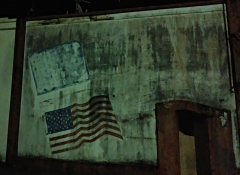
To be continued in Chapter 7
22:50 Posted in Music, My novel | Permalink | Comments (0)
08 August 2022
Novel: "Henoko Bar, Stars and Stripes" Chapter 5 "Bring Back Okinawa!"
In Henoko, Nago City, Okinawa Prefecture, shaken by the issue of the construction of a new U.S. military base, a female singer time slips to the time in the midst of the Vietnam War. What is the Henoko New Base Problem? What is the Vietnam War? What is America? What is Okinawa?
A short story in 9 chapters. Each chapter features famous songs from Japan, the United States and Okinawa.
Please read from Chapter 1.
The next morning, Naomi apologized to Obaa at the inn for losing her claws to play the Sanshin. Obaa said to her, "It's okay because I have lots of them." But Naomi thought that if she could go to that bar again and see Kenny, she would ask him to give the claws back.
That morning, she went to a sit-in in front of the construction gate of Camp Schwab. The construction vehicle gate was established separate from the gate for vehicles of U.S. troops and personnel at Camp Schwab.


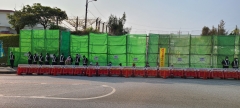
To prevent trucks and tanker trucks and other vehicles that come to the construction gate from enterring, they placed chairs in front of the gate and sit down. Dozens of people from inside and outside the prefecture sit side by side in chairs in front of the entrance for the construction vehicle.
Participation is based on individual liberty. There was no compulsion in the activities here. Also, there was no reward. The sit-in is a voluntary act of nonviolent disobedience. The sit-in itself is said to be subject to the Road Traffic Law and the crime of obstruction of business by force, but in Okinawa Japan even before the reversion, sit-ins were held for many years as an anti-base movement, and this action has been understood as freedom of expression or civil disobedience act. It is said to be a method that traces the father of the Indian independence movement, Gandhi, the father of the American civil rights movement, Reverene Martin Luther King.
However, when construction vehicles came, police officers and riot police appear and eliminate people who sat down. In this case, the organizers would instruct them not to resist being pulled over by a police officer unnecessarily. Do not raise your hand to the police or riot police even if you are dragged away without resistance or your body was carried by riot police and carried away. It is the protestors policy not to arrest or injure anyone.
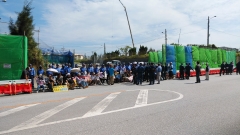
If the gate is opened after being eliminated, construction vehicles enter and carry out base construction work in the base, but since there are sit-ins three times a day (9:00 in the morning, noon, and 3:00 pm), the number of vehicles entering would be reduced compared to when there was no one at all. Therefore, the pace of construction was slowed, and the idea is that if the social and political situation would change as time passed by, the construction of the base can be canceled before it is completed.
Naomi didn't feel like taking part in the sit-in. She’s only just arrived. She just decided to sing in front of the people who were sitting down. She sang "沖縄を返せ, Okinawawo kaese, (Bring Back Okinawa)," which she learned from Kenny last night. She sang while playing guitar.
Bring back OKINAWA!
Breaking the hard soil
An island burning with the wrath of the people
Okinawa.
We and our ancestors
With Blood and sweat
protected and nurtured Okinawa
We cry out for Okinawa
Okinawa is ours
Bring back Okinawa [Bring back]
Bring back Okinawa
(Lyrics:全司法福岡高裁支部 Composed by:ARAKI Sakae)
The people sitting in the sit-down chanted "Bring back Okinawa!" in unison, raising the mood.
An elderly participant said.
"I used to know this old song, it's a song about reversion to my homeland. However, recently Okinawa should be returned to Okinawa! I'm tempted to say. Even if we went back to Japan, we are still forced to live with a base like this."
The construction vehicles were coming. Police and riot police were also approaching. Just as Naomi felt like joining the sit down with them, Genjiro arrived.
"Thank you, Naomi, I was watching. It was a great song with your great voice."
He said with a smile.
"Genjiro, I was worried you didn't contact me the whole time, I thought you were angry and forget about me."
Naomi said.
"Come on," Genjiro said, taking Naomi's hand. The couple left the construction vehicle gate.

"I'm sorry, I've been so busy since the day before yesterday that I'm supposed to meet with Diet member, Kenny. We were asking him to run as a candidate for the governor."
"Met with Kenny?" asked Naomi.
"What?" Genjiro looked surprised that Naomi had called him without “-san” or “mister”.
"Oh, Kenny-kun, no, Kenny-san," Naomi hurriedly rephrased. She had a very strong impression of Kenny, the boy she met last night. Genjiro said.
"I want Kenny-san to become the prefectural governor and follow in the footsteps of the previous governor and work with the administration to stop the construction of the new Henoko base, and we are going to hold a prefectural referendum. Until now, even if anti-base politicians are elected, our voice would be distracted by the claim saying elections are not just about making one pledge but choose the candidate, so this time we will hold a single issue voting event to ask 1.4 million prefectural residents whether or not to approve construction of the new Henoko Base. I asked him to put this referendum on his promise."
Genjiro's eyes were shining. She was glad she followed him to Okinawa.
"That's great, I'm sorry. I'm unserious," Naomi said.
"No, I shouldn’t have expect you to suddenly understand everything, so why don't we go play somewhere today?" and Genjiro.
"No, I'm going to be there all day long, with you."
Naomi was uplifted. That day, Naomi sang a song during the noon and afternoon sit-ins in front of the gate, and sat down in front of the gate with Genjiro.
It was the end of the 3 p.m. sit-in. One of the participants in the sit-in, an elderly man named Inaba, asked if they would like to take a boat ride with the world's largest blue coral in Oura Bay with a glass bottom and a view of the sea. Mr. Inaba is said to be an environmentalist to protect Oura Bay. They accepted the invitation. From the sit-in site, they took a car ride for about 20 minutes, board a tour boat called a glass-bottom boat from the Shioma fishing port facing Oura Bay, and looked out over the sea under the bottom of the boat.

The flocks of coral dazzling in the crystal clear water were so beautiful that it made them want to look at them forever, like looking at a jewel ornament. It is said to be the largest in the world and 3,000 years old. Naomi and Genjiro were impressed. They weren’t supposed to go out together that day, but just looking at this coral was enough to lift her emotion and she felt a pleasure that went far beyond the feeling of ordinary leisure.
Inaba said. If the ocean currents in Oura Bay change due to the reclamation of the new base construction, this rare coral reef would also be damaged by changes in sea temperature. Naomi thought she had to protect this coral
Back in Henoko, Genjiro left Naomi because he had a meeting with his friends. They will have dinner together at a private inn. He would stay at a private inn tonight with his activity buddies.
Alone, Naomi suddenly became curious and walked to the bar on the Stars and Stripes wall. It's about a ten-minute walk from the inn. She was seeing the buildings of the Stars and Stripes in the daytime; The coloring book of the Stars and Stripes, as faint as at night, exuded a strange feeling.

Then she noticed that the entrance door was open. Is there anyone inside? Yes, there was something she wanted to confirm for a moment.
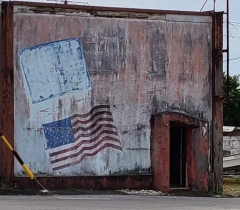
Naomi went inside.
"Pardon" she said.
Inside, a middle aged man was working on what appeared to be a clean up of the things inside.
"Oh, hello, what's the matter?" the man said.
"Yes, this place was open last night, wasn't it?" asked Naomi.
"Well, we haven't been in business here for many years, it's been closed a long time ago," the man said in surprise.
"Are you sure? I came here last night, this place was open," Naomi said, not hiding her surprise.
"It's impossible, wasn't that somewhere else?" said the man.
Naomi looked inside the bar. Although it was daytime, there were no windows, only light coming in through the door, and it is a little dim inside, but the inside is quite old, but it was the same construction that she saw last night. There was a counter and a live stage. There were no tables, but instead there were lots of luggage such as cardboard. She looked up at the ceiling and saw a lantern that looked like a chandelier with a light bulb removed and hung with a stick. Then there was the jukebox, which was dusty, tattered and hadn't been used in years.
"But I came here last night, and there were a lot of American soldiers inside," Naomi said. She just couldn't be convinced.
"Just kidding, this place was closed in my grandfather's generation. The U.S. soldiers didn't come in very often. Since then, it has only been used as a storeroom. Only me or my family can get in. There are no electric lights, so you can only enter during the day. I lock it at night. Also, I'm thinking about demolishing this building because it's getting old."
The man said with a puzzled expression.
Naomi could understand that the man wasn't lying. That's exactly what the man meant. Those American soldiers and Kenny weren't the people of her time.
She looked at the wall and saw several pictures hanging on it. There was a black and white photo with a familiar face. It was the bar master she met.
"This guy is the master of the bar," Naomi pointed out.
"Oh, it's my grandfather, he's gone. It's a picture taken during the time when he was running this bar. It looks like it's before Okinawa reversion to Japan."
Another photo is of the appearance of the bar. She saw that the Stars and Stripes flag painted on the wall clearly appeared in black and white image. Next to the building was a large American-made car that gave a sense of the times.
There was also a familiar board next to the photo. Dozens of dollar bills are pinned to one board. There were about three boards. She only saw one last night. After that, many more bills seemed pinned. Are these dollar bills, a dollar bill of a U.S. soldier who did not return?
"I'm sorry, I'm leaving," Naomi said as she left the building. Naomi was convinced. She had a terrible experience. Did he travel across time and space? Time slip? Did she have such a cinematic experience?
That evening, Naomi had dinner with Genjiro and his fellow activists. Okinawan food made by my Obaa was served. Bitter Gourd Champloo, Island Shallot, Mimigar, Orion Beer and Awamori were served, all of which were delicious. To liven up the scene, Naomi also performed a song. Everyone was overjoyed by her beautiful voice and singing ability.
The activists were all highly conscious people who focused not only on the construction of the new Henoko Air Base but also on social issues such as global environmental problems and LGBT issues, and although there were aspects that did not suit Naomi, she was able to get along with them through Genjiro. She has come to look at the world through her songs and sincerely hope that she could make the world a little better. But she’s also realized that she couldn’t just sing a song.
After dinner, Naomi sat alone with Genjiro on a bench on the terrace of the inn. He grabbed Genjiro's hand and leaned over his shoulder to speak. Because he was drunk with beer and awamori, her chest gets hot when she was hanging out with Genjiro.
"I'm glad I came to Okinawa, I'm glad I followed you."
Naomi said.
"I'm glad you're with me, Naomi-san," Genjiro said with a smirk.
"Hey, let's go somewhere and have a drink together," Naomi said.
"Oh, there is no place to drink here, unlike Shinjuku. There are a few bars where locals gather, but we are not welcome," said Genjiro.
Naomi suddenly had an idea at those words. There was something I wanted to tell Genjiro.
"Hey, there's a place I want you to come with me, it's a short walk away."
Naomi stood up and tugged at Genjiro by the hand.
Ten minutes later, they were standing in front of the Stars and Stripes wall building in the dark night.

Naomi recounted the events of the day before last night, last night, and the day. She showed him an image of Miyagi Kenny on her smartphone.
"Oh my gosh, did you go back in time in this bar?" and Genjiro.
"Yes, I have some confirmation, no doubt about it," Naomi said.
"Sure, this boy looks like Mr. Kenny, but he just looks alike, and you got drunk and wandered off somewhere else, didn't he?" he said.
"But do you think this young boy made fun of me using stories such as the Vietnam War and Okinawa reversion?" said Naomi.
"That's certainly weird, it's pretty elaborate teasing. The fact that you have an image doesn't mean you saw an illusion, so what was that?" Genjiro said, looking at Naomi with a slightly serious face.
Naomi suddenly wanted to ask Genjiro. It's something she expected Genjiro, who was more erudite than her, to explain properly.
"Hey, what kind of war was the Vietnam War?" I only knew a little bit, but what kind of things did the war bring to Okinawa and the world?"
To be continued in Chapter 6
17:40 Posted in Music, My novel | Permalink | Comments (0)
31 July 2022
Novel: "Henoko Bar, Stars and Stripes" Chapter 4 "Raise your hands and dance Kacharsi"
In Henoko, Nago City, Okinawa Prefecture, shaken by the issue of the construction of a new U.S. military base, a female singer time slips to the time in the midst of the Vietnam War. What is the Henoko New Base Problem? What is the Vietnam War? What is America? What is Okinawa?
A short story in 9 chapters. Each chapter features famous songs from Japan, the United States and Okinawa.
Please read from Chapter 1.
Thinking about having a beer before playing something, Naomi headed to the counter. Then there was a very young Black man. He was more of a boy than a young man. He's younger than the American soldiers here. And he was not a pure Black boy. It's a mixture of Black people who seem to have Asian blood mixed in.
"Come on, Nee-san (Young lady)," he greeted her with a normal Japanese.
She wondered if he was an American who spoke good Japanese. And when she looked at him closely, she thought it was a familiar face somewhere. It was a face she had seen somewhere, just recently.
"Hey, Kenny, how are you doing?" Jimmy talked to the Black boy.
She got it. Diet member Mr. Miyagi, Kenny. He was a member of the National Assembly who was reported on the TV news as a likely candidate to succeed the will of the previous governor in the upcoming gubernatorial election. But the Kenny in front of him was much younger than Kenny Miyagi she knew. The face of a dignified politician had changed into a very adorable boy. He looked like a junior high school student or a high school student. Maybe he was Kenny's son. But she thought it was weird a father and son shared the same name.
"Hey, Nee-san (Sister), you have a Sanshin instrument, are you going to play something?" said Kenny.
"Yes, well," Naomi said with an expression that couldn't hide her surprise.
"I play the Sanshin too, because this instrument is our soul" said Kenny.
"That's right," Naomi said. Somehow, Kenny looked cute. He was a really cute boy. Who the hell is he?
Then an American guy approached and spoke up to Kenny. He was one of the U.S. soldiers in this bar besides Jimmy. He was about the same height as Jimmy with a blonde hair.
"Hey, Niger, this is where you shouldn't be entering, get out."
What a rant. is a pejorative term for Black people in America.
"No, I work Here, I'm Okinawan” Kenny replied in English. Kenny had a rag in his hand and was wiping down the counter table.
"Tony, don't get stuck," Jimmy said. The blonde young man seemed to be named Tony.
"You Yankee don't know," Tony said.
"Yankee? Jimmy, where are you from and where is Tony from?" asked Naomi. A Yankee means an American in the North.
"I'm from Chicago, and Tony is from Mississippi," Jimmy replied.
Indeed, Naomi understood that because he came from the conservative southern state of Mississippi, there was a strong sense of prejudice against Black people. But isn't it too bad for these days?
"Who are you?" Tony asked Naomi, who was wearing a shoulder strap attached to the instrument.
"I'm from Tokyo," she replied in English.
"Hey, Black Okinawan and the Jap woman," Tony said.
What a vile man. She felt like getting a little drunk and rowdy.
"We're Americans, our country is the strongest country in the world. We own Okinawa. It's the best country in the world," Tony said in English with a Southern accent.
America owns Okinawa? Okinawa is the territory of Japan. It's true that there were a lot of U.S. military bases.
Kenny said to Tony. "Not true, Okinawa is occupied by the US, but it is still part of the Japan. And Okinawa belongs to the Okinawans. It's not American," Kenny said in English. Does "occupied" mean that there were many U.S. military bases on the island? Naomi thought.
Then she said to Tony.
"America is such a great country? Is there anything to be proud of?"
"The whole world longs for America, they imitate American culture. This is also the case here. You're using the culture that the U.S. created," Tony said proudly, and Naomi frowned.
"Oh, after all, American culture is just a copy of European culture, it's just a carbon copy of the culture brought in by European immigrants."
Naomi said what she thought from her experience in Europe.
"What? Aren’t you listening to American jazz and rock?"
Tony said blushing. Then Kenny said,
"Jazz and rock were created by Black people from Africa mixing with European music, so they were not original to the United States," he said glaring at Tony.
"Hey, a cheeky like you is just a jerk in my hometown of Mississippi."
Tony said, glaring back. Then Jimmy said,
"No. You can’t be racist if you are American. You are wrong. You know the Civil Rights Act enacted a few years ago," taunting Tony.
"What's wrong with a law like that, what's wrong with discriminating them," Tony said.
"It goes against the ideals of American freedom and democracy. The idea of democracy is that all human beings should be equal and free. Both President Kennedy and Dr. King fought for it and enacted laws banning discrimination."
Jimmy said emphatically.
"Both Kennedy and King got killed because they did things like that, because they did weird things," Tony said.
"No. US has fought for it. Our parents fought against the Nazis who wanted to conquer Europe. With the Japanese army that invaded China and attacked the US, and we won. We're fighting to save people who are tormented by invaders who do brutal things on others based on their arrogance against others," Jimmy replied, and Tony fell silent for a while. Then,
"Unlike you, I volunteered to go to Vietnam," he said.
"Oh, yes, you did. I was drafted. I think it's an important duty," Jimmy said.
"I’m a proud United States Marine, I’m going to be like my big brother," Tony said.
"Joe, oh, everyone's hero. Right now, he’s fighting on the front lines in Vietnam. He's the best soldier with extraordinary strength and decorated a lot of medals. Everyone’s a role model," Jimmy said.
"Oh, a true warrior for freedom and democracy. I will be like my brother Joe. It's just like GI Joe," Tony said in a shouting voice. G.I. Joe was an American antique toy doll that was modeled after a military man.
"Yes," Jimmy and a few other U.S. soldiers around him responded.
Neither Kenny nor Naomi could keep up with the American military-like conversation, but for the time being, the tension in the room seemed to ease. Is this how Americans do?
Kenny talked to the master at the counter. Then Kenny said to Naomi.
"Hey, Sister, try playing something by Sanshin and singing, you seem to be good at singing," Kenny said.
"Sure, I do" she replied.
She went on stage as if she was being led by Kenny. She decided to sing the freshly learned song "Tinsagu no Hana. (Phoenix Flower)" She wondered if the American soldiers would understand. She sang while playing the intrument.
"The phoenix flower is something that dyes the fingernails.
The teachings of our parents are ingrained in our hearts."
"The clusters of stars in the heavens can be counted if you count.
There are countless teachings from our parents ."
"Ships crossing the ocean at night are marked by the North Star.
For us, parents are a landmark."
Of course, the American soldiers did not know the meaning of the lyrics, but her beautiful voice and the smooth melody played by the Sanshin captivated them at once. She thought it was too quiet for the energetic young people, but it seemed to have won their hearts firmly. Jimmy approached the stage.
"Bravo, beautiful," he shouted with applause. Other soldiers also applauded.
Good, Naomi thought. Kenny then asked, "Hey, hey, can you sing Kacharsi?"
"Oh, to tell you the truth, I just learned it, I can’t play like Tinsagu no Hana, though I've learned a song," she said, smiling and expressing her regret at not being able to respond to requests.
"So I'll play, will you sing and dance?" said Kenny.
"I just have to sing and dance," Naomi said.
"Yes." Kenny said.
"Ok," Naomi said, handing the instrument and claws to Kenny. Kenny tied the instrument with his shoulder straps, clawed at his fingers, and immediately began to play Sanshin.
Kacharsi's up-tempo rhythm reverberates. He’s used to playing it and it's good.
Naomi performed the kacharsi dance she had learned from her grandmother and approached the microphone and began to sing. Dancing is very easy. Raise your hands, raise your fingers, and rotate your hands in all directions. Naomi thought she was going to lure them in, and she said.
"Raise Your Hands, and Dance with Me."
The U.S. soldiers were initially stunned, but Jimmy imitated Naomi’s dancing right in front of the stage, raising his hands and dancing Kacharshi together with Naomi. Then the American soldiers in the bar got tangled up and raised their hands and started dancing. It went into party mode all at once.
カチャーシー, Kacharsi means "to stir" in Okinawan and just as it means, the inn owner Obaa told her that it is a dance unique to Okinawa, dancing while stirring hands. The song was called "唐船ドーイ, Tang Ship Doi", which is representative among Kacharsi.
Tang Ship Doi Santeman
Isan-ran (ba) eh Nana Shiya
Wakasa Town Village Nu Senanami Nu Tanme
The meaning is "It's a ship from the Tang Dynasty! and the one who doesn't run at a glance is the grandfather of Senaba in Wakasa Township," but none of them make sense. Since the purpose is to dance, you don't have to worry about the meaning of the lyrics. It is also common to the lyrics of Spanish flamenco.
As Naomi sang the lyrics, Kenny, who played Sanshin, interjects, "Iyasa, Iyasa, Sa, Sa," in the background of the voice.
All of them continued to dance over and over again. All the American soldiers in the bar were engrossed in the dance. It was noisy, but it was in a very high-spirited and good mood.
Naomi looked at Tony at the counter. When Naomi started dancing, he was drinking and didn't seem to mind, but now he was dancing together. He was not a bad guy, she thought.
Two hours later, all the U.S. soldiers had returned to the base, the bar turned silent, the master had entered the office room, and Kenny and Naomi sitting tired on stage alone.
"I had a wonderful experience tonight, the American soldiers can enjoy Okinawan music."
Naomi said, still feeling tired.
"Thanks, actually, I didn't even know how to deal with that situation. I wanted to change my mind."
Kenny said about Tony.
"It's terrible, really, racism. It's still very strong in America."
Naomi reminded herself of President Trump and the white conservatives in America who supported him.
"It's terrible here, too, because I've been bombarded with people every day since I was a kid like slurs such as mixed specie or Black boy," Kenny said.
"That's right," Naomi said. She was well aware that Japan is not in a position to criticize the United States.
"But I love Okinawa, where I was born and raised, and Okinawan music. Right now, Okinawa is still under the control of the United States, but if it were to return to Japan someday, I would like to eliminate the U.S. military bases and become a person that I can be even more proud of as Okinawans. It doesn't matter what color your skin is, it is about yourself as Okinawan."
Naomi stammered as Kenny said. After all, She didn't think she was in this bar in 2018. She asked casually.
"A lot of U.S. soldiers from Okinawa are going to Vietnam."
"Oh, and they're killing innocent people, it's like we're being made to cooperate with that," Kenny said.
Naomi only had the simple knowledge about the Vietnam War which she learned in school history course and some history shows on TV. Vietnam was divided into north and south, and the United States started a war in cooperation with the south, but was defeated. She’s heard that not only soldiers but also many civilians were killed.
"Jimmy and Tony are going to Vietnam to do that," Naomi said.
"Oh, they say freedom and democracy are important, but in other countries they push through their own selfishness. Ever since Okinawa was lost in the war and occupied, they have been stealing land to build bases and using us as stepping stones. We have no rights here. It's a colony just to be trampled on. Racism seems to have been banned in the United States, but in Okinawa, bars where American soldiers use are divided between whites and Blacks. It's hypocrisy to do different things inside and outside their own country."
Tony's narrative didn't seem to be very acting, he seemed to tell the real story. After all, am I in Okinawa in the midst of the Vietnam War era? Before Okinawa reversion to Japan.
Naomi asked Kenny as she suddenly noticed a board on the wall of the bar.
"What's on the board with all those dollar bills pinned down?"
"Oh, it was left as a memorial by American soldiers heading to the battlefield. It seems that it is also a wish to write the name on the bill and pin it and get it back if they come back alive."
Kenny said.
"In other words, if they are killed in the battle, bills will be left alone," Naomi said.
"Well, I guess we're going to see more and more dollar bills on that board," Kenny said.
"Somehow, I pity them," Naomi said.
"People in the mainland like you may think so, but it doesn't matter to us, they're the ones who are stomping on us. It's fine if you can use it to make money," Kenny said simply. Even in his uncanny youth, he showed an indescribable toughness. If he was Miyagi Kenny, who could also be that governor, it was a premonition of that.
"Yes, hey, there's a song that people in Okinawa which you should know. There's a song about the Japan Reversion Movement in Okinawa. We don't know how long this will last, but it's a song with the thought that we’re going to get out of it eventually," Kenny said.
Naomi was taught the song and lyrics of the song by Kenny. The title is "Bring back Okinawa."
After that, Naomi decided to leave. it's too late. She wondered what was going on outside of this bar? Last night was back in 2018, but will the same phenomenon occur? Thinking of that, Naomi pulled her phone out of her pocket and viewed her smartphone screen. What she noticed on the screen was that the radio waves were out of range. In Henoko, she could use a smartphone anywhere. It was strange.
Then she activated the camera.
"Hey, what's that, mirror?" asked Kenny.
"Yes, yes, if I have to fix makeup, I’m tired and look terrible," she said, pointing the lens at Kenny and took some pictures of him and interior of the bar, too. The photos were saved as data on her smartphone device.
"Thank you, Kenny, tonight, it was fun. I'm leaving. Oh, and give my regards to Master. I'm the singer of the show, but tell him I'll come here to sing in my spare time."
Naomi said, putting the shoulder straps of the Sanshin over her shoulders and she walked to the entrance door of the bar.
"Thank you, hey, see you soon. Goodnight," Kenny said.
"Goodnight."
Naomi said, opening the bar door and stepping outside. It was the same scene of Henoko Village as when she entered. It was dark and quiet in the middle of the night in the village, and there was only the light of the street lamps. Behind her was a wall of the bar with a fading picture of the Stars and Stripes.
Naomi just came up with something and went back to the entrance door, turning the doorknob, but the door was locked as expected. She just left, so it was very strange the door was locked right away.
Oh, she found had forgotten something. She hanged the instrument, but still Kenny held the claws to play the strings.
Naomi knocked on the door and shouted, "Kenny, Kenny." There was no reaction at all. After all, the inside of the bar is another world. What a strange phenomenon.
Go on to Chapter 5.
19:22 Posted in Music, My novel | Permalink | Comments (0)






